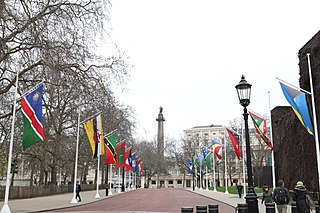
The politics of Gibraltar takes place within a framework of a parliamentary representative democratic British Overseas Territory, whereby the Monarch of the United Kingdom is the constitutional head of state represented by the Governor of Gibraltar. The Chief Minister of Gibraltar is the head of Government. As a British Overseas Territory, the Government of Gibraltar is not subordinate to the Government of the United Kingdom. The British Government, however, is responsible for defence and external affairs but Gibraltar has full internal self-government under its 2006 Constitution.
Federal or foederal (archaic) may refer to:
The Reform Party can refer to a number of current and disbanded political parties of various ideologies.

The British Overseas Territories (BOTs), also known as the United Kingdom Overseas Territories (UKOTs), are fourteen territories with a constitutional and historical link with the United Kingdom. They are the last remnants of the former British Empire and do not form part of the United Kingdom itself. The permanently inhabited territories are internally self-governing, with the United Kingdom retaining responsibility for defence and foreign relations. Three of the territories are inhabited, chiefly or only, by a transitory population of military or scientific personnel. All but one of the rest are listed by the UN Special Committee on Decolonization as non-self-governing territories. All fourteen have the British monarch as head of state. These UK government responsibilities are assigned to various departments of the Foreign, Commonwealth and Development Office and are subject to change.
Progressive Conservative may refer to an advocate of progressive conservatism.
New Republic may refer to:

Commonwealth Day is the annual celebration of the Commonwealth of Nations, since 1977 often held on the second Monday in March. It is marked by an Anglican service in Westminster Abbey, normally attended by the monarch as Head of the Commonwealth along with the Commonwealth Secretary-General and Commonwealth High Commissioners in London. The monarch delivers a broadcast address to the Commonwealth.

Gibraltar elects on the national level a legislature. The Gibraltar Parliament has 17 members, all elected for a four-year term in one constituency with each voter getting to vote for their selection of ten candidates. Gibraltar forms a single constituency but voters have only ten votes. Hence the electoral bloc with the most votes will normally get ten seats and the runners up seven.
Co-operative Commonwealth may refer to:

European Parliament elections were held for the first time in Gibraltar on 10 June 2004 as part of European Union-wide elections. Although part of the European Union, Gibraltar had never before voted in European Parliamentary elections, in part due to its small electorate of just over 20,000 which would cause Gibraltar to be over-represented by about 30 times if even a single seat were to be assigned.

The Gibraltar Constitution Order 2006 was taken to a referendum in Gibraltar on 30 November 2006. A coalition of groups opposing the proposal held that a majority of 60% should be required to give effect to a new Constitution, quoting other instances, but the political parties held that the result should be decided by a simple majority in favour of the new constitution. The constitution was approved by 60% of the votes anyway.
This page is based on this
Wikipedia article Text is available under the
CC BY-SA 4.0 license; additional terms may apply.
Images, videos and audio are available under their respective licenses.



